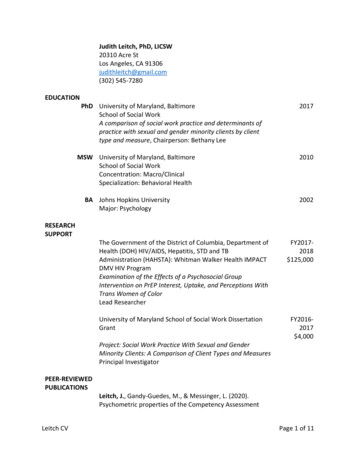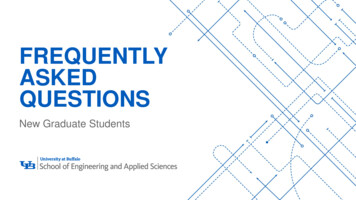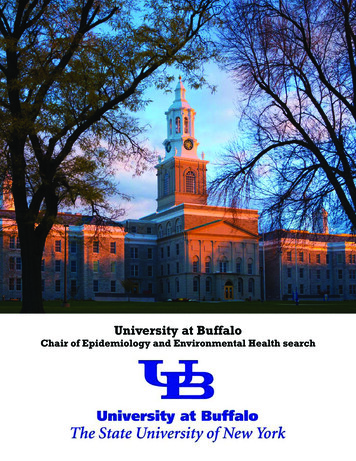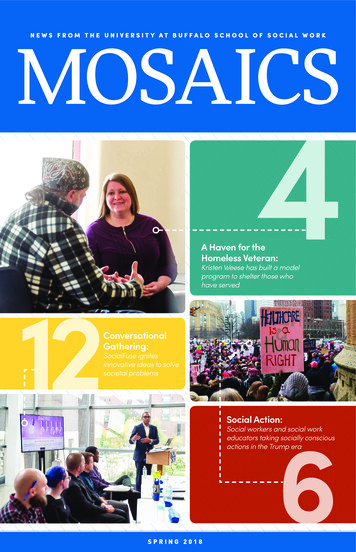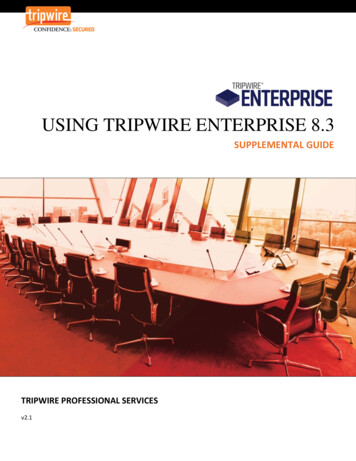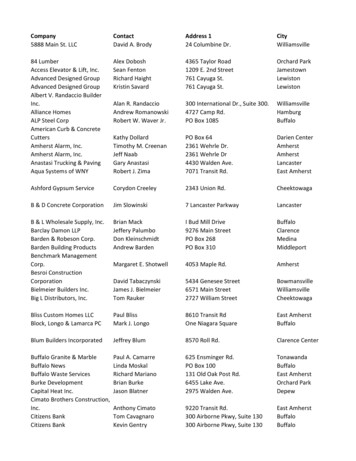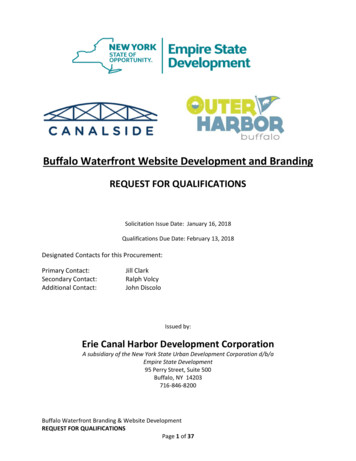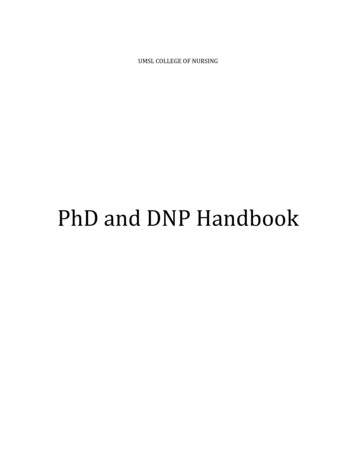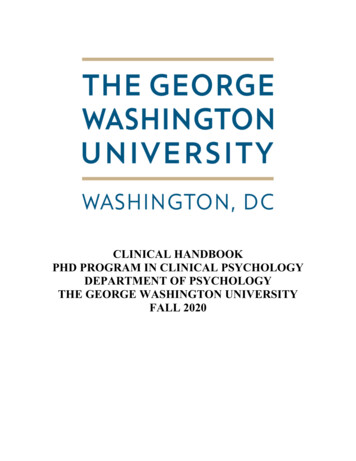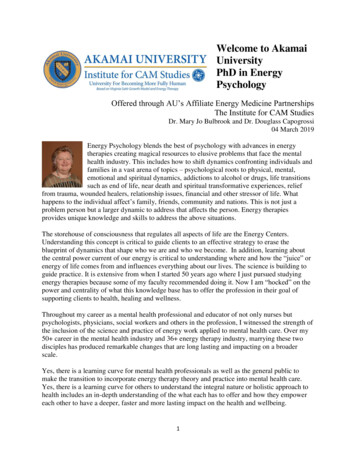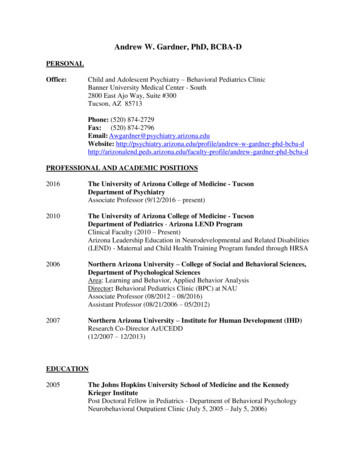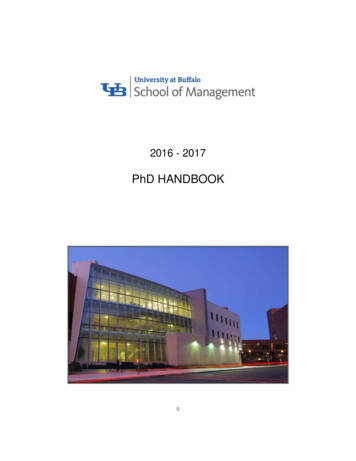
Transcription
2016 - 2017PhD HANDBOOK0
Table of ContentsACADEMIC CALENDAR FOR 2016-17 . 9INTRODUCTION . 9PHD PROGRAM DIRECTORY . 10CHAPTER I – PHD MANAGEMENT PROGRAM OVERVIEW OF REQUIREMENTS . 11CHAPTER II – MAJOR AND MINOR REQUIREMENTS. 15Accounting . 15Finance . 16Management Science and Systems . 19Marketing . 22Operations Management and Strategy . 25Organization and Human Resources . 29CHAPTER III – DOCTORAL CANDIDATES. 33Qualifying Examinations (Comprehensive Exam) . 33Doctoral Program Committee . 33Application to Candidacy. 33Student Budgets . 33Dissertation Proposal and Defense Procedures . 33Oral Defense of a Doctoral Dissertation . 34Reviews of the Dissertation . 34Dissertation and Thesis Work . 34Doctoral Candidates Overview. 35Dissertation Instructions . 35M-Form (Multipurpose Form). 35CHAPTER IV – GRADUATE SCHOOL POLICY ON GRIEVANCE PROCEDURES FORGRADUATE STUDENTS . 36CHAPTER V – DISCIPLINARY PROCEDURES FOR ACADEMIC INFRACTIONS . 36CHAPTER VI – GENERAL INFORMATION . 36State University of New York At Buffalo Policies Governing Non-Discrimination . 36
ACADEMIC CALENDAR FOR 2016-17University calendars are official for all School of Management full-time students.The Office of the Registrar maintains Official Academic and Student Calendars that provide a month-bymonth listing of critical academic and financial dates. Students should refer to the Academic Calendar forall dates relevant to semester start/end dates and holidays. Student calendars provide a month-by-monthschedule of all academic and financial critical dates. Both calendars should be followed carefully forcritical information. Official University dates are binding.The School of Management maintains an event calendar that lists numerous school events for multipleaudiences and normally provides an option to make a reservation for a given event.The university also maintains a general university events calendar that may be of interest and includes anumber of opportunities not listed on the School of Management calendar.STATE UNIVERSITY POLICY REGARDING STUDENT OBSERVANCE OF RELIGIOUS HOLY DAYS“On those religious holy days when members of a faith typically observe the expectation of church orsynagogue that they be absent from school or work, campuses will avoid the scheduling of such eventsas registration, the first day of classes, or student convocations and individual students will be excusedfrom class without penalty if expressly requested.” (From SUNY Policy Manual, 1975, Section No. 091.3.)UNIVERSITY AT BUFFALO PROCEDURE ADDS: “If such a requested absence results in a student'sinability to fulfill an academic requirement of the course on that particular day, then instructors shouldprovide an opportunity for the student to make up the requirement without penalty.”IntroductionThe purpose of this handbook is to acquaint doctoral students with the rules, policies and proceduresgoverning the PhD Program at the School of Management. The Graduate School of the University atBuffalo grants the PhD degree and establishes minimum standards for all graduate students in theUniversity. These standards are described in the Policy icylibrary.html). Within these standards, individual academicunits establish more detailed requirements and procedures for completion of their graduate programs.Academic questions which are not addressed in this handbook should be directed to your academicadvisor. Policy questions can be directed to the Graduate Programs Office, 203 Alfiero Center, NorthCampus, phone: 716-645-3204.Overall policy for the PhD Program is set by the PhD Program Committee, consisting of the chairman, astudent representative, and six faculty members who serve as advisors for the various subject areas inthe program. Incoming students should contact their respective advisors as early as possible to discusstheir individual programs and course requirements. A permanent record is maintained by the GraduatePrograms Office, 203 Alfiero.9
PhD Program DirectoryDr. Darren TreadwayPhD Program Chair280B Jacobs Management CenterPhone: 645-3244Dr. Katherine FergusonAssociate Dean for Academic Programs160 Jacobs Management CenterPhone: 645-3222Jaimie L. FalzaranoSenior Associate Director Graduate Programs203 Alfiero CenterPhone: 645-3204Faculty Advisors are available in each of the following areas:AccountingDr. William Krosswkross@buffalo.eduFinanceDr. Sahn-Wook Huhswhuh@buffalo.eduManagement Science and SystemsDr. Rajiv Kishorerkishore@buffalo.eduMarketingRam Bezawadabezawada@buffalo.eduOperations Management and StrategyDr. Yong Liyl67@buffalo.eduOrganization and Human ResourcesDr. Emily Grijalvaejgrijal@buffalo.edu10
Chapter I – PhD Management Program Overview of RequirementsMajor FieldsEach student is required to select a major field within the School of Management. The dissertation will becentered in this field. At present, a concentration may be selected from:AccountingFinanceManagement Science and SystemsMarketingOperations Management and StrategyOrganization and Human ResourcesCourses in these fields are located within the six departments of the School. These departments areAccounting and Law, Finance, Management Science and Systems, Marketing, Operations Managementand Strategy, and Organization and Human Resources. The Managerial Economics program is offeredjointly by the Department of Economics and the Department of Finance.Related FieldMinor Area of ConcentrationStudents minor in one substantive area and thereby take a number of courses inside or outside theSchool. The content of all official minors is listed at the end of Chapter II. Minors available within theSchool include Accounting, Finance, Management Science and Systems, Managerial Economics,Marketing, Operations Management and Strategy, and Organization and Human Resources. Minorsavailable outside the School include Computer Science, Cognitive Psychology, Economics, IndustrialEngineering, Organizational Communication, Social Psychology, Sociology and Statistics. The advisor ofthe students’ major area should approve the minor. Special minors are also available.PhD Core RequirementsCalculus PrerequisiteA two-semester introductory calculus sequence covering topics in differential calculus, integral calculus,simple differential equations and basic matrix algebra is required.CoreStudents take two statistics courses and two research methodology courses relevant to their major andapproved by the advisor. These courses are usually offered by a department outside the School exceptfor MGO 615 and MGO 616 - Econometric Methods and Managerial Applications I and II.Statistics courses include Mathematical Probability (STAT 501), Mathematical Statistics (STAT 502),Econometrics (ECON 613 and 614), Statistical Inference II (CEP 523), Statistical Methods in Sociology(SOC 607 and 608).11
Research methods include Mathematics for Economists (ECON 611, 612), Applied Stochastic Processes(IE 576), Marketing Research (MGM 667), Research Methods in Sociology (SOC 606), Education andPsychological Seminar (CEP 509), Research Methods in Social Psychology (PSY 704) and methods ofField Research in Social Psychology (PSY 708).MGG 700 - Introduction to Research Methods (should be taken during the first year)First-Year PaperAll students should prepare a literature survey approximately 15 pages in length on the topic that theywish to start working on for their second-year paper. This will be evaluated by a committee at thebeginning of the spring semester of the second-year and no later than the end of the spring semester ofthe second year. All students are required to pass the evaluation.Second-Year PaperAll students must begin a research paper no later than one year after entering the PhD Program. Thepaper is to be evaluated by a committee no later than two and one-half years after the student enters thePhD Program. The committee shall consist of two full-time faculty members selected by the student inconsultation with the PhD advisor. At least one committee member must be a member of the graduatefaculty. Failure to produce a satisfactory paper as determined by the committee will constituteunsatisfactory performance and will necessitate a review of the student by the PhD Program Committee.The student must produce a satisfactory paper before the major qualifying exam is taken. Students arealso required to present this paper at a departmental seminar.The purpose of the paper is to provide an exposure to the full range of activities required to successfullyconduct independent research. The research paper will have all of the characteristics of a publishablepaper except that the overall quality need not be sufficient to merit publication. For example, the normalempirical paper will have all of the elements of a typical empirical article appearing in leading journals inthe student’s area. Similarly, a theoretical paper should have a broad enough range of development towarrant comparison with similar work published in the area.Qualifying Examinations (Comprehensive Exams)Doctoral candidates must take a written qualifying examination in their major field within three (3)years of entry into the program. The comprehensive examination in the major area may be takenbefore completing all courses in the minor. Examinations in minor areas are determined by the policy inthat area. All examinations must be completed successfully before the student applies for"Application to Candidacy." Normally, these examinations are taken immediately after completingcoursework.Arrangements for taking an examination will be made through the appropriate PhD advisor by thestudent. If an examination is failed, it may be retaken. Only in unusual cases, and upon written petition tothe PhD Program Committee of the School of Management, may the examination be taken more thantwice. If such approval is not granted, the student will be terminated from the program. Theseexaminations will be under the control of the department involved. Upon successful completion of eachcomprehensive, the department will notify the Graduate Programs Office, with a copy to the student.DissertationAll students are required to complete a dissertation that is described in Chapter III12
Teaching Skills1. Teaching Assistant WorkshopAll PhD students are required to complete the Teaching Assistant Workshop offered by the University(currently it is offered by the Teaching and Learning Center (TLC)).2. Before a PhD Student Teaches a CourseThe student should work with a professor in his/her department as a Teaching Assistant in a practicumbefore teaching that course. The practicum will expose the student to all aspects of teaching, includingpreparation of class materials, selection of appropriate in-class activities/exercises, preparation andgrading of exams, leading class discussions and actually teaching some classes while being observed byhis/her professor. Each student enrolls for one credit (pass/fail) in the teaching practicum course beforeteaching.3. The Mentoring Process for TeachingPhase 1: Assign Mentor and Identify CourseThe department Chair in concert with the PhD Committee will assign a mentor to a PhD student. Thisshould be done at least one semester prior to the student’s first teaching assignment. The mentor, theDepartment Chair and the PhD student will also work together to identify a course for the PhD student toteach.Phase 2: Teaching EngagementThe PhD student will begin to prepare for the teaching assignment. This should include the following: Attends most, if not all, class sessions of one section taught by the mentor. The mentor may provide access to all course materials including the textbook (examination copy),lecture notes, PowerPoint slides, class handouts, assignments and examinations. The PhD student is encouraged to develop a syllabus, lecture notes, assignments and examinationsas the semester progresses. The PhD student, in consultation with the mentor, will teach the mentor's course for one or two weeksduring the semester. The PhD student and mentor will hold several meetings prior to the two-weekassignment to discuss the student’s proposed teaching strategy. The faculty mentor will meet with thePhD student after each class to discuss class presentation and content. The PhD student will prepareexamination questions for a midterm or final exam related to the material covered during the weeks.Phase 3: EvaluationImmediately after the PhD student has completed the teaching assignment, the mentor will administer ananonymous survey to the students in the course. This survey will be similar to the UBCATS instrumentand will also attempt to elicit specific feedback concerning the PhD student's performance and areaswhere teaching might be improved. The mentor will send a memo to the Department Chair and the PhDCommittee summarizing the PhD student's performance (e.g. comparison with SOM means and overallstudent reaction).4. SPEAK Test Proficiency RequirementThe School of Management requires all incoming international PhD students to have their language skillsevaluated prior to the beginning of their first semester in the program.(1) A student with a SPEAK score at or below 45 will be strongly recommended to participate in theAmerican English Pronunciation* course during the fall semester of Year 1. Subject to availability thestudent is recommended to take ESL 411 during the fall or ESL 412 during the spring semester. Finallythe student should take ESL 512 during their second year in the program. In addition to these courses,students are strongly recommended to participate in ELI’s Chat room.13
The student will be required to retake the SPEAK test in December of Year 1. If they have not obtainedthe required score of 55 they must retake it until the requirement is fulfilled or they have met the teachingcertification interview requirement. The student is not certified to teach until they have reached a 55 onSPEAK or performed a teaching certification interview and passed.(2) A student with a SPEAK score of 50 will be strongly recommended to take ESL 512. A teachingcertification interview will be required for all PhD students in this category before they will be approved toteach.(3) A student with a SPEAK score above 55 will be certified to teach without reservation.* With permission of a PhD advisor a student with a 45 on the SPEAK may request the teaching certification interview* If the course requires extraordinary tuition (e.g., the 185 fee for the American English Pronunciation course), theSchool will underwrite the fee for the first session of a required remedial course.* Failure to take recommended courses during their first semester in the program or failure to perform satisfactorily inthe recommended course will result in an unsatisfactory performance evaluation.5. Teaching RequirementAll PhD students are required to teach at least one course that is a part of the School of Managementcurriculum before degree conferral.a) Students will sit in on a section of the first course that they are to teach prior to their teachingintroduction.b) Courses taught by PhD students will be recorded on their permanent record maintained by the Schoolof Management.c) Copies of Course Evaluations will be directed to area coordinators for each course taught by a PhDstudent.d) A written evaluation of teaching performance will be provided to the area coordinator by either thecourse coordinator or the department chair for each course taught by a PhD student. (It is recommendedthat course coordinators review Course Evaluations and visit a class session).e) As a part of the annual review, the area coordinator will summarize information relating to the student’sexperience as an instructor and evaluate the student’s overall teaching progress.6. COURSE EVALUATIONSThe PhD Committee will review Course Evaluations, written teaching evaluations by course coordinatorsor the department chairs, and area coordinators. Where the committee believes that a student’sperformance as an instructor is substandard, the committee may seek additional input (discussions withthe individual, discussions with the individual’s students, class visitations).When the committee finds that an individual is not making satisfactory progress as an instructor, they mayrecommend:1) that the PhD Committee make an evaluation of unsatisfactory progress;2) that the PhD Committee deny opportunities to teach for compensation;3) that the PhD Committee suspend financial support;4) that the committee review for termination.14
Chapter II – Major and Minor RequirementsAccountingAccounting is a field that deals with developing information which is useful to managers, investors, andother interested parties in evaluating an entity’s financial position. At the PhD level, this involves directlymeasuring how users interact with accounting numbers as well as providing theories for accountingpractice in the areas of Financial Accounting and Managerial Accounting.PrerequisitesAn appropriate background in accounting, finance, and mathematics is assumed. Students may takeMBA-level courses as necessary to fulfill any coursework deficiencies.Major RequirementsThe students majoring in Accounting take the following courses in addition to PhD core requirements.Required Accounting Courses and SeminarsMGF 631 Corporate Financial Managem
The purpose of this handbook is to acquaint doctoral students with the rules, policies and procedures governing the PhD Program at the School of Management. The Graduate School of the University at Buffalo grants the PhD degree and establishes minimum standards for all

